
Political corruption dangerously exposes Nigeria to the coronavirus pandemic
The UK must wake up to the fact that in Nigeria, Christians are undoubtedly the particular focus of creeping violence. Terrorism has been allowed to fester largely because of ineffective and corrupt governments, argues Ayo Adedoyin
Just over a month ago, Africa experienced its first cases of the novel coronavirus, COVID-19. Egypt reported the first case on the Continent, while Nigeria, a country I earnestly hope to help improve through my work for the humanitarian organisation PSJ UK, confirmed the first in sub-Saharan Africa.
Contrary to popular opinion, the virus is spreading in Africa, and follows the exponential trend witnessed in Europe and (until drastic measures were taken) Asia. As of Monday, Egypt had 609 confirmed cases and 40 deaths.
Nigeria now has over 100 known cases and recently reported its first fatality. Mirroring Europe, the Middle East and Asia most countries in Africa, including Nigeria, is going into lockdown and faces school closures amongst other measures. Bear in mind this is happening in a part of the world where widespread institutional education and general living security was already a distant dream for vast swathes of people. The situation has the potential to become significantly catastrophic.
West Africa, in addition to many other parts of the Continent, is ill-equipped to deal with the escalating virus coming its way. Public health systems in Africa are weak or non-existent, and variously backed by UN or WHO programmes that will find themselves increasingly spread out in the coming months. Furthermore, the countries bordering the Sahara desert, known collectively as the Sahel, have spent exhausting years struggling to push back a resurgent ISIS that claimed over 1300 lives last year in Northern Nigeria alone, now controlling the Chad border region.
The warning of a coming apocalypse in West Africa has been made by the US-led commanders on the frontline of the pushback. The security focus of African governments will surely reduce their ability to cope with a virus outbreak of the likes seen in Europe.
West Africa might become the epicentre for a different kind of virus which also has the potential to spread to Europe and other parts of the globe. Major John House, who leads the British element of a training programme in Senegal with the focus on infantry skills and counter-terrorism operations, said:
"If [the international community]don't act we may find the problems getting closer to our door…The more [West African terrorist organisations] have a presence in the region, the more we can feel the effect back in the UK."
US Major Chris Giaquinto, from US Special Operations Command Africa, said the extremists "want to create a safe haven in Africa in order to grow and facilitate attacks, possibly in Europe or the United States".
Islamic State and al-Qaeda are now known to be operating across the sub-Saharan region, and command a West African faction called ISWAP (Islamic State West Africa Province).Commander Djibril Diawara, of the Senegalese Armed Forces, described the situation as "alarming".
I ask you to now imagine what a deadly virus – that has ended the lives of thousands in peaceful Europe – might do to an African region already at war with an emerging Islamist proto-caliphate.
As critical to solving the health crisis West Africa faces, beyond the battle of medicine and of physical concerns, is the battle of minds. Nigerians are in a battle over ideology, over the future vision of their society, and to secure sovereignty and freedom from an invading force.
Adding insult to injury at this special time in the Christian calendar, the most disturbing trend throughout the recent terrorist atrocities is their premeditated character. Each year the aggressors strike precisely at a moment when Christians are gathered together in hopeful expectation and are easy targets. According to Open Doors, 40 Christians were slaughtered in the week leading up to last Easter. On Christmas day, last year, 10 Christians were beheaded. These suggest other motives fuelling these mostly 'silent slaughters' and unreported attacks than climate change, unemployment or desertification. There is an intentionality to these murders, specifically aimed at Christians during a sacred time of the year, that cannot be ignored.
Insurgencies and terrorism has been allowed to fester in a country like Nigeria largely because of ineffective and corrupt governments.
Unlike a virus, which does not distinguish between us, at the cornerstone of ISIS ideology is the principle of kafir, the unbeliever, of which Christians form a part. And not only are Christians deemed unbelievers, they are maliciously attacked for it. For too long both Britain and Nigeria have ignored, sometimes wilfully, this silent slaughter which threatens a genocide that could exceed Rwandan proportions.
There appeared to be rays of hope recently with the Nigerian Government's recent admission that Christians are undoubtedly the particular focus of creeping violence and the UK's recent strong condemnations and proposed lines action in parliamentary debates however with so much of the world's focus now on the impact of the Coronavirus we should be careful to not take our eyes off the potential outbreak of yet another deadly virus.
The UK must wake up to the fact that Nigeria, a prominent Commonwealth member, ranks twelfth on Open Doors World Watch List 2020 of the countries in which Christians are most persecuted. By comparison, Syria ranks eleventh and Saudi Arabia ranks thirteenth, with Iraq fifteenth and Egypt sixteenth. Nigeria is just one rank below 'extreme'.
I welcome the news that the UK, which in artificially defining the borders of West African countries in the nineteenth and twentieth centuries has partly contributed to the chaos, is now involved in resisting Islamist incursions into Mali. It is high time such military aid and collaboration gets emphatically 'offered' directly to Nigeria. That would be 'aid' with several layers of multiplier benefits.
Particularly at a time of heightened crisis owing to the coronavirus pandemic, aid should be channelled to local and efficient charities with proven results of protecting vulnerable citizens, offering medical aid, providing crops for displaced farmers and giving lessons to internal-refugee children fleeing ISIS. It would be naïve to assume foreign aid is used effectively in a country ranked 146th in the Corruption Perceptions Index 2019 – two places lower than 2018 – scoring an abysmal 26 points out of a possible 100, level with Iran. The UK Government's new plan to sanction high-profile human rights abusers around the world is another welcome example of how to turn the tide.
Britain's historic involvement in Africa did not directly create the Islamist threat we now face, but it did set the boundaries for it, politically and geographically. It is fitting that it should now set the boundaries for the solution and prepare the arena for a final defeat of the warped dream of a Sharia caliphate state stretching across Africa and the Middle East. This is very much in Britain's interest. Mayhem in Nigeria will surely precede another exodus of desperate migrants heading for European and British shores.
My hope is that Nigeria, and by extension West Africa, battles through this deadly coronavirus outbreak with the community spirit, creativity and resilience the region is famous for. But my instinct is that the new pandemic could prove to be the nail in the coffin for many vulnerable and innocent Nigerians already devastated by years of corruption and persecution.
To tackle the emerging health pandemic in the terrorised region of West Africa, we must first solve a very different kind of crisis in order to have any hope of ensuring peace and justice for future generations.






